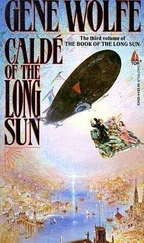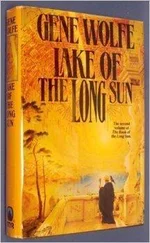Wolfe, Gene - The Best of Gene Wolfe
Здесь есть возможность читать онлайн «Wolfe, Gene - The Best of Gene Wolfe» весь текст электронной книги совершенно бесплатно (целиком полную версию без сокращений). В некоторых случаях можно слушать аудио, скачать через торрент в формате fb2 и присутствует краткое содержание. Жанр: Старинная литература, на английском языке. Описание произведения, (предисловие) а так же отзывы посетителей доступны на портале библиотеки ЛибКат.
- Название:The Best of Gene Wolfe
- Автор:
- Жанр:
- Год:неизвестен
- ISBN:нет данных
- Рейтинг книги:5 / 5. Голосов: 1
-
Избранное:Добавить в избранное
- Отзывы:
-
Ваша оценка:
- 100
- 1
- 2
- 3
- 4
- 5
The Best of Gene Wolfe: краткое содержание, описание и аннотация
Предлагаем к чтению аннотацию, описание, краткое содержание или предисловие (зависит от того, что написал сам автор книги «The Best of Gene Wolfe»). Если вы не нашли необходимую информацию о книге — напишите в комментариях, мы постараемся отыскать её.
The Best of Gene Wolfe — читать онлайн бесплатно полную книгу (весь текст) целиком
Ниже представлен текст книги, разбитый по страницам. Система сохранения места последней прочитанной страницы, позволяет с удобством читать онлайн бесплатно книгу «The Best of Gene Wolfe», без необходимости каждый раз заново искать на чём Вы остановились. Поставьте закладку, и сможете в любой момент перейти на страницу, на которой закончили чтение.
Интервал:
Закладка:
There were restaurants near the hotel, and he ate quietly a meal made sumptuous by custom. There was a newsstand where he stopped for a few paperbacks, and, next door, a barbershop.
A haircut was not part of the ritual, but it might well be. He might, in years to come, remember this as the year when he had first had his hair cut on the way to Beech Hill. The shop was clean, busy, but not too busy, smelling of powder and alcoholic tonics. He stepped inside, and as he did a customer was stripped of his striped robe and dusted with the whisk. “You’re next,” the barber said.
Bobs looked at another (waiting) customer, but the man gestured wordlessly toward the first chair.
“Chin up, please. Medium on the sides?”
“Fine.”
There was a television, not offensively loud, in a corner. The news. He watched.
“Don’t move your head, sir.”
The man on the screen was portly, expensively dressed, intelligent looking. A newsman, microphone in hand, spoke deferentially:— a strike . . . , pollution . . . , Washington? . . .
“I know that man.” Bobs twisted in the chair. “He’s a billionaire.”
“Damn near. He sure enough owns a lot around here.”
When Bobs paid him the barber said, “You feel okay, sir?”
T
he next day he dropped the black Beretta into its holster. On the bus the weight of it made him feel for a moment (he had closed his eyes) that the woman next to him was leaning against him. The woman next to him became Wally Wallace, a salesman he had once known, the man who had introduced him to Beech Hill, but that seemed perfectly natural. Opposite, so that the four of them were face-to-face as passengers had once sat in trains, were Bishop and his wife, pretending not to know them. This was courtesy—the Bishops never spoke to anyone until it had been definitely decided what they were going to be. He knew that without being told.
“You,” Wally began. Bobs suddenly realized that he (Bobs) was ten years younger, and the wistful thought came that he would not remain so. “. . . can’t beat this place. There’s nothing like it.” Bobs had wondered if Wally was not getting a commission—or at least a reduction in his own rate—for each new guest he brought. Wally had returned the second year, but never after that. Lost in the jungle he loved.
W
hen Bishop and Potts and Claude Brain were gone (they had said something about a morning swim) Bobs remarked to the countess, “I saw a friend of ours on television. On my way up.” He mentioned the billionaire’s name.
“Ah,” said the countess. “Such a nice man. But”—she smiled brilliantly— “married.”
“He was here when I first came.”
At first he thought the countess was no longer listening to him; then he realized that he had not spoken aloud. The billionaire had been there when he had first come. Very young, as everyone had said, to have made so much money. Great drive.
And yet perhaps —he tried to push the thought back, but it came bursting in anyway, invading his consciousness like the wind entering a pauper’s shack— perhaps he had made it .
He had wanted to badly. You could see it in his eyes. And then—
What fun! What sport to return, posing with the others year after year.
The bastard .
The bastard. Was he here yet?
Bobs could not sit still. The fear was on him, and he stalked out of the immense house that was Beech Hill, hardly caring where he was going. The ground sloped down, and ahead the clear water of the lake gleamed. Half a dozen guests were swimming there already: drama critic, heart surgeon, the madame of New York’s most exclusive brothel. Fashion designer, big-game hunter, test pilot. Bobs stood and watched them until Claude Brain, coming up behind him, said, “No dip today, Roberts?”
“I don’t usually,” Bobs replied, turning. Brain was in trunks. His arms were horribly scarred, and there were more scars on his chest and belly.
His eyes followed Bobs’s. “Tiger,” Brain said. “I was lucky.”
“I guess it’s hard to become a wild-animal man? Hard to get started?”
Brain nodded. “There aren’t many spots. A few places around Hollywood, and a few shows. You try and try, but most of them have already had so much trouble with greenhorns they won’t touch you.”
“I’ll bet,” Bobs said sympathetically.
“Hell, I did everything. For years. Sold shoes, worked in a factory. Bought my own animals. First one was a mountain lion. Cost me three hundred and fifty, and I’ve still got him.”
“I know how you must feel,” Bobs said. He watched Brain go down into the water. His back was scarred too.
There was a path along the water’s edge. Bobs walked slowly, head down, until he saw the girl; then she looked at him and smiled, and he said, “Sorry. Hope I’m not intruding.”
“Not at all,” the girl said. “I should be over with the others, but I’m afraid I’m shy.” She was beautiful, in the blond-cheerleader girl-next-door way.
“Your first season?”
She nodded.
“You’re the actress then. Bishop said something about you when I checked in last night.”
“Thanks for not saying starlet .” She smiled again.
“The star. That’s what Bishop called you. Have you made many pictures?”
“Just one— Bikini Bash . You didn’t—”
Bobs shook his head. “But I will, the next chance I get.”
“They say a lot of important people come here.”
Bobs nodded. “To look at the nuts.”
The girl laughed. “I get it. Beechnuts.”
“Yeah, Beechnuts. Listen, I want you to do me a favor.” He drew his pistol and handed it to her. “What’s this?”
Puzzled, she looked at it for a moment, then laughed again. “A toy pistol?”
“You’re sure?”
“Of course. It says right here on it: British Imperial Manufacture , and then: MADE IN HONG KONG .”
He took the gun and threw it as far as he could out into the lake. She stared at him, so he said: “Remember that. You may be called to testify later,” before he walked away.

AFTERWORD
This story was based, in one way, on the Milford Writer’s Conference. In another, on an academic I once knew. Dom (as I shall call him) is dead now, but when “Beech Hill” was written he was a major figure in the study of popular culture.
You may have heard of Baron von Steuben, one of George Washington’s most valued—and valuable—subordinates. To put it bluntly, von Steuben was a fraud in almost every respect. He said he was a Prussian nobleman and that he had been a general in the army of Frederick the Great. He was a commoner and had been a captain. But he could do what he said he could do . He could turn farm boys into soldiers, and he could do it fast; it was a talent our fledgling America needed desperately—a talent that von Steuben provided.
Dom was like that. He wore tweed jackets and smoked a pipe. He spoke with a dubious British accent and sounded pompous even when what he said was not. He gave you every reason to think him a lovable fraud. Yet he knew his subject backward and forward and cared deeply about it. I knew him, as I said, and in a way I based the story you have read upon him. We are the poorer for his passing.
THE RECORDING
I
have found my record, a record I have owned for fifty years and never played until five minutes ago. Let me explain.
When I was a small boy—in those dear, dead days of Model A Ford touring cars, horse-drawn milk trucks, and hand-cranked ice-cream freezers—I had an uncle. As a matter of fact, I had several, all brothers of my father, and all, like him, tall and somewhat portly men with faces stamped (as my own is) in the image of their father, the lumberman and land speculator who built this Victorian house for his wife.
Читать дальшеИнтервал:
Закладка:
Похожие книги на «The Best of Gene Wolfe»
Представляем Вашему вниманию похожие книги на «The Best of Gene Wolfe» списком для выбора. Мы отобрали схожую по названию и смыслу литературу в надежде предоставить читателям больше вариантов отыскать новые, интересные, ещё непрочитанные произведения.
Обсуждение, отзывы о книге «The Best of Gene Wolfe» и просто собственные мнения читателей. Оставьте ваши комментарии, напишите, что Вы думаете о произведении, его смысле или главных героях. Укажите что конкретно понравилось, а что нет, и почему Вы так считаете.









